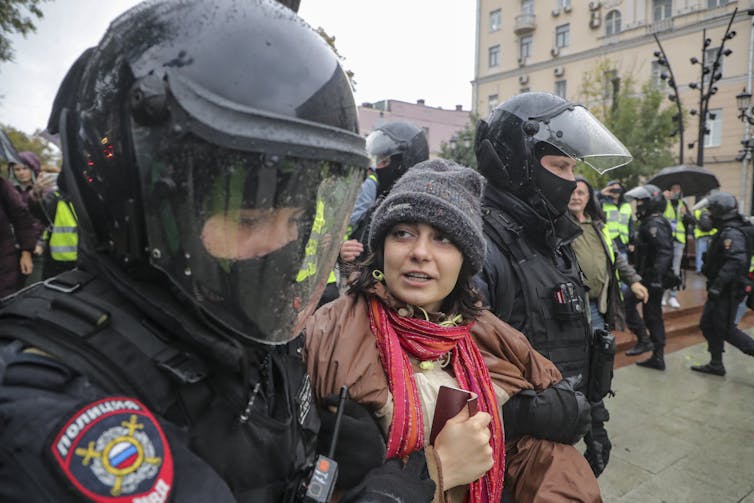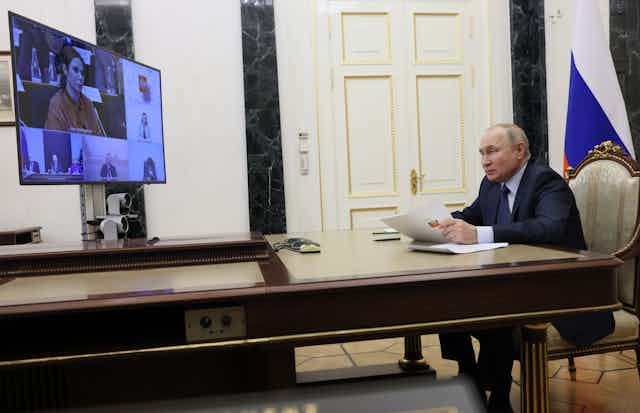Leaked internal Russian government polling recently indicated that as few as one in four Russians may be in favour of the war in Ukraine. Analysts believe that the forced mobilisation of over 300,000 civilians and the high level of casualties have all contributed to waning support for Russia’s war effort.
The polling, which also found that more than half the Russian people hope their government will enter peace talks, was reportedly conducted for the Kremlin’s Federal Guard Service (FSO) and published by the exiled dissident news website Meduza.
It’s important to bear in mind the source of this reporting and that obtaining accurate survey data one way or another is notoriously difficult but the UK ministry of defence said the results were “consistent with a separate October 2022 survey [conducted by the independent Levada Center] which found that 57% respondents reported being in favour of talks”.
This alleged collapse of support for the war has led to speculation about the security or otherwise of Vladimir Putin’s position as president. But while this is clearly the most precarious moment in Putin’s presidency, the chances of Putin being ousted remain low – even if maintaining his grip on power will become much more difficult.
Since taking office in 2000, Putin has enjoyed solid public support, which reached 82% after the annexation of Crimea in 2014. But research suggested that Putin’s popularity with the Russian public was genuine.
Meanwhile, the Kremlin’s near total monopoly over the media has meant that information is tightly controlled. Most of the news that citizens consume comes from of television shows that spew pro-Putin propaganda.
Unsurprisingly, this propaganda machine was ramped up to win over hearts and minds after the invasion in February. News programmes faithfully repeated the line that the Russians were successfully liberating Ukraine from neo-Nazi Ukrainians who were allegedly raping Russian women and killing their husbands (even as late as April when it was becoming clear to the rest of the world that this “military operation” was going far from swimmingly).
When the west responded to Russia’s invasion with its harsh packages of sanctions, leading to severe shortages and inflation, Putin’s propaganda machine squarely placed the blame on the west – which reports said had always been trying to destabilise Russia. And research has shown that, for the most part, this disinformation campaign has been fairly effective. Most Russians still believe Nato is responsible for escalating the conflict in the Donbas. They are also fearful for the Russian-speaking population in Ukraine.
Putin’s grip on power
While a growing number of the Russian population is expressing unhappiness at the war, estimating the exact number is tricky. And there remain plenty of reasons why these signs of discontent do not spell the end of Putin’s grip on power.

For one thing, Putin has coup-proofed his regime, ensuring that loyalists dominate the upper echelons of the military and security services (although the error-prone conduct of the war might well lead to discontent in the lower ranks, especially among more junior generals whose attrition rate has been remarkably high).
Putin’s political elite tend to share his worldview and hanker after a return to the glory days of empire. The siloviki – strong men – who surround him are just as hawkish about the conflict and Russia’s place in the world, as is Putin himself. These include the advisers responsible for feeding Putin the flawed intelligence that the Russian military would easily crush Ukraine’s armed forces.
At the other end of the political spectrum, a bottom-up regime change would require far greater popular discontent. A noted study by US researchers Erica Chenoweth and Maria Stephan has shown that for protests to be successful, there would need to be at least 3.5% of the population – in Russia’s case, 5 million people – taking to the streets against the regime. So far we’ve only seen thousands willing to brave reaction from the security services by expressing their discontent with Putin’s leadership.
And the Russian public is far too polarised to ensure the success of a revolution or a coup attempt. This is the most salient takeaway from the most recent polling. Russia’s climate of division is more conducive to a dictatorship than a healthy democracy.
An online experiment by academics from the US and Germany, the results of which were published in blog form in June 2022, found that citizens that supported the war were willing to punish fellow citizens who did not share their views on the conflict. Based on my interviews a couple of months ago with Russians who fled to Georgia, this bitter disagreement exists within members of the same family.
Controlling opinion
Public opinion in Russia tends to be fairly tightly controlled, apart from an elite relatively few who are able to access international media via VPNs (virtual private networks) or shortwave radio and other means of bypassing the Putin administration’s blanket censorship. Most Russians still rely on the television for their news – which is entirely state-owned and completely on-message.
So it’s not surprising that most Russians trust the government and believe that their president knows best. As with many in the Soviet Union, many Russians prefer a strong hand, or a decisive style of leadership. And older citizens remember the chaos of the years after the Soviet Union was dissolved, during the country’s brief experiment with democracy. This last factor explains why there is a sizeable number of Russians who may dislike the war, but otherwise support Putin.
In the early days, despite his clear authoritarian tendencies, Putin didn’t need to resort to repression. This is no longer the case – and repression has become more widespread. As the country prepares for the 2024 presidential election, there are fears that there will be more show trials, repressive laws and threats and violence against those who protest against them.
While Putin faces many more challenges to his power than he did in the past, reports of his impending downfall are clearly exaggerated.

